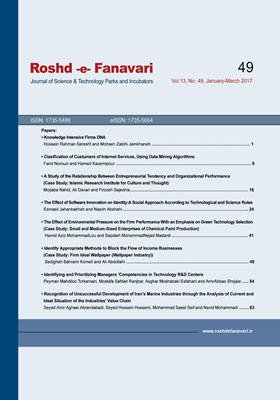A Study of the Relationship between Entrepreneurial Tendency and Organizational Performance (Case Study: Islamic Research Institute for Culture and Thought
Subject Areas : كارآفريني و مديريت شركتهاي دانش بنيان
Mojtaba Nahid
1
*
![]() ,
ali davari
2
,
Firouzeh Sajednia
3
,
ali davari
2
,
Firouzeh Sajednia
3
1 -
2 - University of Tehran
3 - University of Tehran
Keywords: Entrepreneurial orientation, aspects of entrepreneurial orientation, performance of an organization, Islamic Research Institute for Culture and Thought,
Abstract :
One of the most important concerns which have coerced organizations to illustrate tendency toward entrepreneurial activities is survival and growth. This is, thus, to assert that time is ripe for investigating the relationships between entrepreneurial behavior and performance. This study is aimed at investigating the relationship between entrepreneurial orientations and organizational performance of the Islamic Research Institute for Culture and Thought in 2013. To do so, descriptive and correlative research methodologies were used to examine the relationships among these variables. Statistical population of this study contains a number of university staffs at different managerial levels, members of Faculty Board, and experts, who are estimated to constitute 110 persons from the total number of 320. Pearson correlation and multivariable regression methods were used to analyze data. Moreover, Structural Equation Model (SEM) was employed to affirm the model. Results show that there is a positive and direct relationship between entrepreneurial orientation and organizational performance. In addition, there is indirect relationship among innovation, leadership, risk-taking, and aggressive competition as aspects of entrepreneurial orientation, on the one hand, and organizational performance, on the other. However, there was no relationship between independence and organizational performance. Therefore, development of attitude and attention to entrepreneurial orientation in an organization can be effective in elevating organizational performance.
1- رجبزاده قطري، علي؛ حسنزاده خوشطینت، عليرضا، نالچيگر، نيلوفر و نالچيگر، سروش (1389)، ارائه مدل عوامل مؤثر بر ايجاد ريسك در زنجيره تأمین الكترونيكي و تأثیر آن بر عملكرد سازماني مديريت فناوري اطلاعات، دوره 2، شماره 4، ص 59 - 78.
2- رضوي، سید مصطفی؛ زالي، محمدرضا؛ رشيدي، محمود و ديداري، جاويد (1390)، نقش گرايش کارآفرينانه در عملکرد سازماني؛ شعب بانک ملت شهر تهران، پژوهشنامه مديريت اجرايي، دوره 3، شماره 5، ص 95 – 116.
3- رهنورد، فرجهاله (1387)، عوامل مؤثر بر ارتقای عملکرد سازمانهای بخش دولتی ایران. پژوهشنامه مدیریت، سال هشتم، شماره 4، ص 79.
4- عبدالوهاب، سليمه (1390)، بررسي تأثیر قابليت نوآوري و گرايش کارآفرينانه بر عملکرد شرکتهای بيمه خصوصي در ایران (مطالعه موردي: شرکتهای بيمه خصوصي کارآفرين و پاسارگاد)، پایاننامه کارشناسیارشد دانشکده کارآفرینی دانشگاه تهران.
5- فطرس، محمدحسن و بیگی، تورج (1389)، بررسی تطبیقی اثرات سرمایه فکري بر عملکرد سازمانی صنعت بانکداري ایران در دو بخش دولتی و خصوصی؛ مطالعه موردي: بانکهای شهر تهران، پژوهشنامه مدیریت اجرایی، سال دهم، شماره اول.
6- Brenkert George, G. (2009). Innovation, rule breaking and the ethics of entrepreneurship, Journal of Business Venturing, 24, 448-464.
7- Hill, E. (2003). The Development of an instrument to measure intrapreneurship: Entrepreneurship within the corporate setting, New York: McGraw - Hill Irwin.
8- Zeqiri, I. (2010). A theoretical overview of the interactions between entrepreneurship and strategic management, Munich Personal RePEc Archive (MPRA paper), Online at http://mpra.ub.uni-muenchen.de/21943/, No. 21943, pp. 1-9.
9- Rauch, A., Wiklund, J., Lumpkin, G. T., & Frese, M. (2009). Entrepreneurial Orientation and business performance: Cumulative empirical evidence. Entrepreneurship Theory and Practice. 33(3) , 761-788.
10- Fang, Niu., & zhang, yulian. x .H, )2009(. Acquistition .of resources, formal organization and entrepreneurial orientation of new ventures ,Journal of Chinese entreprenurship, 1(1) , 40-25.
11- wang, Y., & zhang, x. (2009). operationalization of corporate entrepreneurship and its performance implications in china, Journal of chiness entrepreneurship, 1(1) , 8-20.
12- Lumpkin, G. T., & Dess, G. G. (1996). Clarifying the Entrepreneurial Orientation Construct and Linking it to Performance, ACADEMY OF MANAGEMENT REVIEW, 21, 135-172.
13- Avlonitis, G. J., & Salavou, H. E. (2007). Entrepreneurial orientation of SMEs, product innovativeness, and performance, Journal of Business Research, vpl. 60, pp. 566–575.
14- Rhee, J., & et al. (2010). Drivers of innovativeness and performance for innovative SMEs in South Korea: Mediation of learning orientation, Technovation, 30, 65–75.
15- Lee, S. M., Seong-bae, L., & Raghuvar, D. P. (2011). Culture & entrepreneurial orientation: a multicountry study. International Entrepreneurship & Management Journal, 7, 1-15.
16- Ergün Ercan., & et al. (2004) Connecting The Link Between Corporate Entrepreneurship And Innovative Performance, Global Business and Technology Association Annual Conference Proceedings Book, pp. 259-265.
17- Memili Esra., & et al. (2010). The critical path to family firm success through entrepreneurial risk taking and image, Journal of Family Business Strategy, Vol. 1, pp. 200–209.
18- Walter, A. & et al. (2006). The impact of network capabilities and entrepreneurial orientat ion on university spin-off performance, Journal of Business Venturing, Vol. 21, pp. 541– 567.
19- Hughes, M., & Morgan, R. E. (2007). Deconstructing the relationship between entrepreneurial orientation and business performance at the embryonic stage of firm growth, Industrial Marketing Management, 36(5), 651-661.
20- Tat keh, H., & Mai Nguyen. (2007). The Effects Of Entrepreneurial Orientation and Marketing Information On the Performance Of SMEs, Journal of Business Venturing, 592-611.
21- Oswald, J. )2005(. Manufacturing regeneration through corporate, Emerald Group publishing limited, 25(5), 491-511.
22- Aktan, B., & Bulut, C. (2008). Financial Performance Impacts of Corporate Entrepreneurship in Emerging Markets: A Case of Turkey, European Journal of Economics, Finance and Administrative Sciences, Vol. 12, pp. 69-79.
23- Li, Y-H,. Huang, J-W,. & Tsai, M-T. (2009). Entrepreneurial orientation and firm performance: the role of knowledge creation process, Industrial marketing management, Vol.38.
24- Lee, Sang M. & Lim, Seongbae. (2009), Entrepreneurial orientation and the performance of service business, Servise Business, No. 3, pp. 1-13.
25- Tajeddini, K. (2010). Effect of customer orientation and entrepreneurial orientation on innovativeness: Evidence from the hotel industry in Switzerland, Tourism Management, Vol. 31, pp. 221–231.

